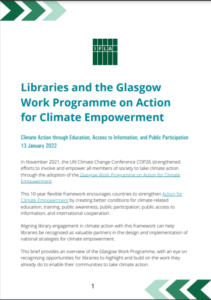Looking Ahead at Climate Action in 2022
14 January 2022
The UN Climate Change Conference (COP26), hosted in November 2021 by the United Kingdom in Glasgow, ended with some positive progress, but not nearly enough. Many have underlined that more drastic work must still be done to address the climate emergency and secure global net zero emissions by 2050, in line with the Paris Agreement.
The goal to limit global warming to 1.5 degrees C. above pre-Industrial levels still stands – but on shaky legs. More than ever, leaders must take more ambitious steps to mitigate the climate emergency. This must be done in a just and inclusive way – in which all people are empowered to participate in climate action. Libraries can help make this possible.
IFLA engages in climate action on multiple fronts – amplifying the valuable resources offered by libraries through their collections, the possibilities for information access and research support, the knowledge of their staff, and the inclusive spaces they provide within their communities.
Outcomes from COP26 offer new possibilities to embed the value of libraries in climate action at the international, regional, national, and local levels. Over the course of 2022, IFLA will continue amplifying the impact of libraries, advocating for their inclusion in climate policy, and supporting our membership with engaging in climate action.
Here is a look ahead at climate action at IFLA.
Action for Climate Empowerment
Action for Climate Empowerment (ACE) addresses the social aspects of climate action. It works to empower all members of society to participate in addressing climate issues through the six elements of ACE: education, training, public awareness, public participation, public access to information, and international cooperation.
This vector of climate action is covered by Article 6 of the United Nations Framework Convention on Climate Change (UNFCCC) and Article 12 of the Paris Agreement [read more on libraries and the Paris Agreement].
Libraries are well-suited in their communities to address the six elements of ACE, and so can be considered valuable partners and key stakeholders in national and local climate empowerment strategies.
COP26 added new momentum to ACE through the adoption of the Glasgow Work Programme on Action for Climate Empowerment.
This 10-year flexible framework encourages countries to strengthen implementation of Action for Climate Empowerment by creating better conditions for climate-related education, training, public awareness, public participation, public access to information, and international cooperation.
The Glasgow Work Programme offers new opportunities for libraries to demonstrate the work they already do in these critical areas of climate action. Aligning your library’s climate action initiatives to ACE and building relationships with ACE National Focal Points are two actions that can help bolster the role of libraries in achieving major climate policy goals.
Over the course of 2022, IFLA will look to grow recognition of libraries as stakeholders in ACE implementation at the international and national levels and help our members embed this framework into their climate action initiatives.
Find out more! Click here for IFLA’s Policy Brief on Action for Climate Empowerment.
Climate Heritage
IFLA is a founding member of the Climate Heritage Network. This network of stakeholders from civil society and local government has been a tireless voice amplifying the role that culture, cultural heritage, and the arts play in achieving climate goals.
During COP26, IFLA engaged with Climate Heritage Network in order to bring a library voice to these conversations. For more detail, refer to: Bringing the Voice of Libraries to COP26.
This has laid a strong groundwork, but there is still much to be done to mainstream the role of culture, including documentary heritage, and Indigenous and traditional knowledge, in climate action across sectors. ‘
Over the course of 2022, IFLA will continue our active work with Climate Heritage Network. Through this, we will already set our sights on preparation for COP27, to be hosted in Sharm El-Sheikh, Egypt in November 2022.
Stay tuned for more on climate heritage over the course of the year.
Climate Action Across IFLA
Climate change is broadly reaching. Mitigating its effects, while also looking for innovative ways to transition our economies and societies to environmentally sustainable models, requires cross-sectoral collaboration and partnerships at all levels.
Values that can impact on climate action and address the climate emergency can likewise be found across many areas of librarianship. Therefore, IFLA will look to coordinate our work in our Professional Units, on our Advisory Committees, and in collaboration with strategic partners to address the role of libraries in climate action from multiple angles.
Cultural Heritage
The Advisory Committee for Cultural Heritage (CCH) is considering projects that will further develop understanding of how libraries, through their documentary heritage collections, can inform research, engage their communities in climate action, and inspire solutions.
The CCH, along with other areas of IFLA working on cultural heritage, including the PAC Centre Network and the Preservation and Conservation Section, will also undertake various initiatives on disaster risk reduction and management. Building capacity among memory institutions to prevent and mitigate risk is an important aspect of establishing climate resilience.
ENSULIB
IFLA’s Environment, Sustainability, and Libraries (ENSULIB) Section will continue acting as a key platform for bringing together libraries participating in climate action, engaging members in international dialogues, and celebrating best-practices.
Find out more about ENSULIB and how to get involved:
- Check the ENSULIB Update for January 2022 for more on the Section’s recent and upcoming activities
- A Call for Submissions has recently been announced for the IFLA Green Library Award 2022. Click here for more information on the award and submission instructions.
IFLA is always looking for stories that demonstrate how libraries involve their communities in taking climate action! Feel welcome to reach out to share a story or request more information: [email protected]